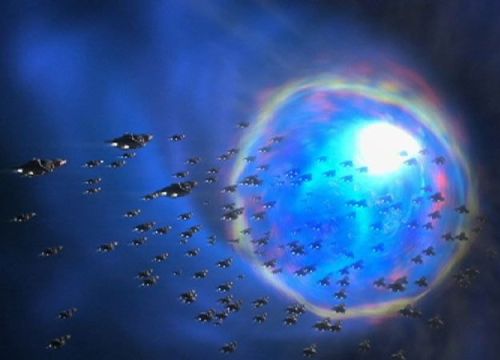Subscribe to the Grand Strategy Newsletter for regular updates on work in progress.
Discord Invitation
Post with 8 notes
Biodiversity in an Intelligence-Rich Cosmos

In The Wilderness Hypothesis I speculated on an approach to the Fermi paradox in terms of the cosmos as a wilderness in which apex predators roam at will and prey civilizations would make themselves scarce out of self interest in avoiding the apex predators. (Also cf. the Wow! Signal burst spoken word version, The Wilderness Hypothesis, as well as my post Rewilding the Cosmos Primeval.) I don’t consider this to be a complete response to the Fermi paradox, or even a strong response to the Fermi paradox, but it is at least as good as many other responses to the Fermi paradox, and ultimately I think it will be the sheer multiplicity of possible responses of the Fermi paradox that will make it possible for us to understand our place in the universe, which is the indirect significance of the Fermi paradox.
In my previous several posts –
Another Counterfactual for Intelligence-Rich Biospheres,
Civilizational Collapse, Trophic Cascades, and Keystone Species, and
Keystone Species in Intelligence-Rich Biospheres
– I further continued my thought experiments in intelligence-rich biospheres, which are biospheres in which two or more intelligent agents evolve. To what extent can we extrapolate from ecological principles that hold within a planetary biosphere to ecological principles for the cosmos entire? A detailed answer to this question might be characterized as an inquiry into astroecology. At present I want to focus on a small fragment of astroecology, which involves an extrapolation of the intelligence-rich biosphere thought experiment to the cosmos at large.
Even if no one, single planet has an
intelligence-rich biosphere, there could still be multiple intelligent species
in the universe, in which case the cosmos itself could be intelligence-rich, or even intelligence-dense. This was once a common assumption, especially in SETI research. In Is Anyone Out There? by Frank Drake and Dava Sobel, the first chapter is titled, “Intimations of an Infinitely Populated Universe.” One would expect in an infinitely populated universe that such a universe would be intelligence-rich, if not intelligence-dense.
As an extrapolation of the continuum from an intelligence-impoverished biosphere to an intelligence-dense biosphere (i.e., the biospheric extrapolation of intelligence density), we can posit a continuum from an intelligence-impoversihed cosmos to an intelligence-dense cosmos (i.e., the cosmological extrapolation of intelligence density). Because of our own existence as an intelligent species, we can assert that the most intelligence-impoverished cosmos scenario is not instantiated by our universe, i.e., our universe is not a universe with no intelligent species whatsoever. A universe with a single intelligence species might be called a minimally-intelligent cosmos, and at the present time we do not know where our universe lies along the continuum from a minimally-intelligent cosmos (or, if you like, an intelligence-minimal cosmos) to an intelligence-dense cosmos.
While this question must remain unanswered for the present time, we can speculate that the existence of multiple intelligent species interacting within the universe would affect the total distribution of life and intelligence in the universe, just as the existence of multiple species interacting in a food web of the terrestrial biosphere affect the total distribution of life within the biosphere. Ecology describes these distributions with ideas like that of the trophic pyramid and trophic cascades.
A single intelligent species that had made a breakout to spacefaring civilization would possess a first mover advantage in distributing the life associated with its homeworld biosphere throughout the cosmos. Anywhere that that intelligence traveled in its biological form (i.e., assuming that it chose not to expand by AI virtual proxy), would involve the inclusion of a variety of related homeworld species, whether domesticated species for food and industrial materials, companion species, and even the microbiome of the intelligent species’ gut bacteria. If, further, that intelligent species coupled its exploration of the universe with a desire to distribute species of its homeworld biosphere throughout the cosmos (e.g., Claudius Gros’ Genesis Project), there would result an ecological homogeneity characterizing the entire universe.
If, on the other hand, two or more intelligent species having made a breakout to spacefaring civilization, each exploring the universe and experiencing the other as a limit to its exploration and the distribution of homeworld flora and fauna, the ecological constitution of the universe would be radically different from that contemplated above. In the event of multiple spacefaring species, multiple ecological zones would correspond to the spacefaring range of each species.
It is in the context of multiple spacefaring species that we might see something like
The Wilderness Hypothesis
instantiated, such that different intelligent species came to play different ecological roles in an intelligence-rich cosmos, with some being prey species, some predator species, some species coming together in mutualism, commensalism, or parasitism, and so on. Here the idea of a an apex predator species dominating some region of the cosmos makes sense, and the extent of the apex predator range, its rivalry with other apex predators of congruent ranges, and the survival strategies of other intelligent species lower in the cosmological trophic pyramid, would all affect the distribution of species within the cosmos.
Here the influence of an apex predator intelligent species would serve a function much like apex predators in the terrestrial biosphere, largely keeping would-be spacefaring civilizations close to their homeworld and so increasing cosmological-scale biodiversity by preventing the species of any one world from dominating the cosmos.


A translation of this post into French is available:
 gradschoolgoth reblogged this from geopolicraticus
gradschoolgoth reblogged this from geopolicraticus  gradschoolgoth liked this
gradschoolgoth liked this 88y53 liked this
dogrecon reblogged this from geopolicraticus
dogrecon liked this
chobanist liked this
infinitedigressions liked this
geopolicraticus posted this